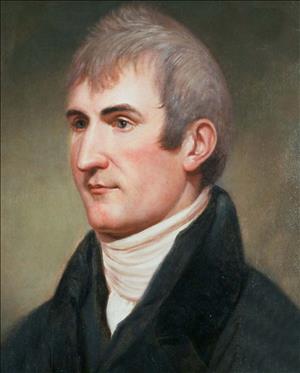On October 10, 1805, Lewis and Clark and the Corps of Volunteers for Northwestern Discovery enters what is now the state of Washington, at the confluence of what they call the "Koos koos ke " (Clearwater River) and the "Kimooenem" or "Lewis’s River" (Snake).
The Corps of Volunteers was President Thomas Jefferson’s name for the group assembled by Meriwether Lewis (1774-1809) and William Clark (1770-1838) near St. Louis, Missouri, in the spring of 1804. The group spent the winter at Fort Mandan in North Dakota. There, the party grew to a total 33 people, including a young Shoshone woman whose name is variously spelled Sacagawea, Sakakawea, and Sacajawea, and her infant son, Jean Baptiste. Beginning in the spring of 1805, they traveled up the Missouri River to its headwaters in present-day Montana, across the Continental Divide and the Bitterroot Mountains in Idaho, and down the Clearwater River to where it meets the Snake River, on the border between Lewiston, Idaho, and Clarkston, Washington.
The main objective of the mission was to find a "Northwest Passage" -- a short, easy portage that would link the headwaters of the Missouri and the Columbia rivers and thus provide a water route across the continent. Instead, the explorers found a range of mountains more daunting than anything they had imagined. By the time they stumbled, exhausted and starving, out of the Bitterroots and into the Weippe Prairie east of Lewiston, they knew the fabled passage did not exist.
Traveling in five dugout canoes (made with the help of Nez Perce Indians in Idaho), the explorers hurried down the Clearwater to the Snake. From here they would reach the Columbia -- the "Great River of the West" – and ultimately their final goal, the Pacific Ocean.
They camped at a site on the Snake near what is now the Port of Clarkston. Fish were plentiful but game scarce. Local Indians offered to sell them a few dogs. In his journal, Clark commented that "…our diet [is] extremely bad having nothing but roots and dried fish to eate," adding "all the Party have greatly the advantage of me, in as much as they all relish the flesh of the dogs, Several of which we purchased…." (Clark, October 10, 1805). From this day until the following spring, dog flesh would be an important part of the daily fare for the Corps of Discovery, but Clark could never bring himself to eat it, sometimes to his great discomfort.

